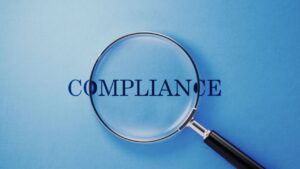The company stamp, also known as a “company chop”, is an everyday tool of document processing and authentication. It is used to endorse a wide range of routine business documents, including invoices, purchase orders, receipts, delivery orders, and official letters.
1) What Is A Company Stamp Exactly?
The company chop is typically a self-inking or pre-inked rubber stamp housed in a plastic or metal casing. It leaves a simple ink imprint on the paper.
A standard company stamp will display the company’s full name and UEN, and often includes the registered address and corporate logo.
2) Is A Company Stamp Compulsory?
No, this type of stamp has never been a mandatory legal requirement for a document to be considered valid.
A company stamp’s primary functions are practical: to serve as a strong signal of authenticity and, more importantly, to provide a convenient method for complying with the Unique Entity Number(UEN) display rule under Section 144(1A) of the Companies Act.
The company stamp itself is not legally required, but the information on it is.
The Singapore Companies Act (specifically Section 144) requires your company’s full name and UEN (company registration number) to be displayed in a legible form on all “business letters, statements of account, invoices, official notices and publications.”
A rubber stamp is simply the easiest, fastest, and most professional way to comply with this law.
3) Why Are People Still Asking For My Company Stamp On Documents?
Even without a legal mandate, a strong cultural expectation for stamped documents persists within the Singaporean business ecosystem.
Many organizations, both in the private and public sectors, may still have internal policies or simply an ingrained preference for receiving stamped official documents.
Providing a stamped document proactively avoids unnecessary friction, queries, or delays from people who may perceive an unstamped document as incomplete or unofficial.
The continuing relevance of a company chop stems from its powerful “soft power” in commercial and cultural contexts.
4) Does My Company Need To Get A Company Stamp?
It’s optional. Most modern Singaporean companies don’t bother. However, you might still consider one if you do a lot of business with local and overseas parties who may still expect to see an official seal on documents.
5) What To Include In Your Company Stamp?
The design of your stamp should be clear, professional, and contain all the necessary information.
The Essentials. These are non-negotiable for a stamp to serve its purpose for compliance and identification. Your company stamp must include:
- Your company’s full, officially registered name
- Unique Entity Number (UEN) or company registration number.
The Recommended. Including the company’s registered address is highly recommended for a general-purpose stamp, as it provides complete contact information on any document it is used on.
The Optional. For branding purposes, you can also include your company logo, phone number, and website. A well-designed stamp can be a subtle yet effective marketing tool.
6) Getting Your Company Stamp Made
There are several types of stamps available, with the main difference being the inking mechanism.
- Self-Inking Stamps: These are the most popular choice for office use. The ink pad is built directly into the stamp’s mechanism and re-inks the rubber die before each impression. They are clean, fast, and ideal for repetitive stamping tasks.
- Pre-Inked Stamps: In this type, the die itself is infused with a special oil-based ink. They often produce a sharper, clearer impression than self-inking stamps and are very quiet to operate. They may require a brief pause between impressions to allow the ink to replenish at the surface.
- Traditional Rubber Stamps: This is the most basic and cheapest option. It consists of a rubber die on a handle and requires a separate, external ink pad. While cost-effective, it is less convenient and can be messier than modern alternatives.








